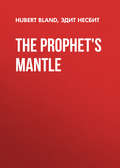
Эдит Несбит
The Literary Sense
THE OBVIOUS
HE had the literary sense, but he had it as an inverted instinct. He had a keen perception of the dramatically fitting in art, but no counteracting vision of the fitting in life. Life and art, indeed, he found from his earliest years difficult to disentwine, and later, impossible to disentangle. And to disentangle and disentwine them became at last the point of honour to him.
He first knew that he loved her on the occasion of her "coming of age party." His people and hers lived in the same sombre London square: their Haslemere gardens were divided only by a sunk fence. He had known her all his life. Her coming of age succeeded but by a couple of days his return from three years of lazy philosophy – study in Germany – and the sight of her took his breath away. In the time-honoured cliché of the hurried novelist – too hurried to turn a new phrase for an idea as old as the new life of spring – he had left a child: he found a woman. She wore a soft satiny-white gown, that showed gleams of rose colour through its folds. There were pink hollyhock blossoms in the bright brown of her hair. Her eyes were shining with the excitement of this festival of which she was the goddess. He lost his head, danced with her five times, and carried away a crumpled hollyhock bloom that had fallen from her hair during the last Lancers, through which he had watched her. All his dances with her had been waltzes. It was not till, alone again at his hotel, he pulled out the hollyhock flower with his ball programme that he awoke to a complete sense of the insipid flatness of the new situation.
He had fallen in love – was madly épris, at any rate – and the girl was the girl whose charms, whose fortune, whose general suitability as a match for him had been dinned into his ears ever since he was a callow boy at Oxford, and she a long-black-silk-legged, short-frocked tom-boy of fourteen. Everyone had always said that it was the obvious thing. And now he had, for once, done exactly what was expected of him, and his fine literary sense revolted. The worst of all was that she seemed not quite to hate him. Better, a thousand times better, that he should have loved and longed, and never won a smile from her – that he should have sacrificed something, anything, and gone his lonely way. But she had smiled on him, undoubtedly she had smiled, and he did not want to play the part so long ago assigned to him by his people. He wanted to be Sidney Carton. Darnay's had always seemed to him the inferior rôle.
Yet he could not keep his thoughts from her, and for what was left of the year his days and nights were a restless see-saw of longing and repulsion, advance and retreat. His moods were reflected in hers, but always an interview later; that is to say, if he were cold on Tuesday she on Thursday would be colder. If on Thursday he grew earnest, Sunday would find her kind. But he, by that time, was frigid. So that they never, after the first wildly beautiful evening when their hearts went out to each other in a splendour of primitive frankness, met in moods that chimed.
This safe-guarded him. It irritated her. And it most successfully bewitched them both.
His people and her people looked on, and were absolutely and sadly convinced that – as her brother put it to his uncle – it was "no go." Thereupon, a certain young-old cotton broker appearing on the scene and bringing gifts with him, her people began to put pressure on her. She loathed the cotton-broker, and said so. One afternoon everyone was by careful accident got out of the way, and the cotton-broker caught her alone. That night there was a scene. Her father talked a little too much of obedience and of duty, her mother played the hysterical symphony with the loud pedal hard down, and next morning the girl had vanished, leaving the conventional note of farewell on the pincushion.
Now the two families, being on all accounts close allies, had bought jointly a piece of land near the Littlestone golf links, and on it had built a bungalow, occupied by members of either house in turn, according to any friendly arrangement that happened to commend itself. But at this time of the year folk were keeping Christmas season dismally in their town houses.
It was on the day when the cotton-broker made his failure that the whole world seemed suddenly worthless to the man with the hollyhock bloom in his pocket-book, because he had met her at a dance, and he had been tender, but she, reflecting his mood of their last meeting, had been glacial. So he lied roundly to his people, and told them that he was going to spend a week or two with an old chum who was staying up for the vacation at Cambridge, and instead, he chose the opposite point of the compass, and took train to New Romney, and walked over to the squat, one-storied bungalow near the sea. Here he let himself in with the family latch-key, and set to work, with the help of a box from the stores, borne behind him with his portmanteau on a hand-cart, to keep Christmas by himself. This, at least, was not literary. It was not in the least what a person in a book would do. He lit a fire in the dining-room, and the chimney was damp and smoked abominably, so that when he had fed full on tinned meats he was fain to let the fire go out and to sit in his fur-lined overcoat by the be-cindered grate, now fast growing cold, and smoke pipe after pipe of gloomy reflection. He thought of it all. The cursed countenance which his people were ready to give to the match that he couldn't make – her maddening indecisions – his own idiotic variableness. He had lighted the lamp, but it smelt vilely, and he blew it out, and did not light candles because it was too much trouble. So the early winter dusk deepened into night, and the bitter north wind had brought the snow, and it drifted now in feather-soft touches against the windows.
He thought of the good warm dining-room in Russell Square – of the gathering of aunts and uncles and cousins, uncongenial, perhaps, but still human, and he shivered in his fur-lined coat and his icy solitude, damning himself for the fool he knew he was.
And even as he damned, his breath was stopped, and his heart leaped at the sound, faint but unmistakable, of a key in the front door. If a man exist not too remote from his hairy ancestors to have lost the habit of the pricking ear, he was that man. He pricked his ears, so far as the modern man may, and listened.
The key grated in the lock – grated and turned; the door was opened, and banged again. Something was set down in the little passage, set down thumpingly and wholly without precaution. He heard a hand move along the partition of match-boarding. He heard the latch of the kitchen door rise and fall – and he heard the scrape and spurt of a struck match.
He sat still. He would catch this burglar red-handed.
Through the ill-fitting partitions of the jerry-built bungalow he could hear the intruder moving recklessly in the kitchen. The legs of chairs and tables grated on the brick floor. He took off his shoes, rose, and crept out through the passage towards the kitchen door. It stood ajar. A clear-cut slice of light came from it. Treading softly in his stockinged feet, he came to it and looked in. One candle, stuck in a tea-saucer, burned on the table. A weak blue-and-yellow glimmer came from some sticks in the bottom of the fireplace.
Kneeling in front of this, breathless with the endeavour to blow the damp sticks to flame, crouched the burglar. A woman. A girl. She had laid aside hat and cloak. The first sight of her was like a whirlwind sweeping over heart and brain. For the bright brown hair that the candle-light lingered in was like Her dear brown hair – and when she rose suddenly, and turned towards the door, his heart stood still, for it was She – her very self.
She had not seen him. He retreated, in all the stillness his tortured nerves allowed, and sat down again in the fur coat and the dining-room. She had not heard him. He was, for some moments, absolutely stunned, then he crept to the window. In the poignant stillness of the place he could hear the heavy flakes of snow dabbing softly at the glass.
She was here. She, like him, had fled to this refuge, confident in its desertion at this season by both the families who shared a right to it. She was there – he was there. Why had she fled? The question did not wait to be answered; it sank before the other question. What was he to do? The whole literary soul of the man cried out against either of the obvious courses of action.
"I can go in," he said, "and surprise her, and tell her I love her, and then walk out with dignified propriety, and leave her alone here. That's conventional and dramatic. Or I can sneak off without her knowing I've been here at all, and leave her to spend the night unprotected in this infernal frozen dog-hutch. That's conventional enough, heaven knows! But what's the use of being a reasonable human being with free-will if you can't do anything but the literarily and romantically obvious?"
Here a sudden noise thrilled him. Next moment he drew a long breath of relief. She had but dropped a gridiron. As it crashed and settled down with a rhythmic rattle on the kitchen flags, the thought flowed through him like a river of Paradise. "If she did love me – if I loved her – what an hour and what a moment this would be!"
Meantime she, her hands helpless with cold, was dropping clattering gridirons not five yards from him.
Suppose he went out to the kitchen and suddenly announced himself!
How flat – how obvious!
Suppose he crept quietly away and went to the inn at New Romney!
How desperately flat! How more than obvious!
Suppose he – but the third course refused itself to the desperate clutch of his drowning imagination, and left him clinging to the bare straw of a question. What should he do?
Suddenly the really knightly and unconventional idea occurred to him, an idea that would save him from the pit of the obvious, yawning on each side.
There was a bicycle shed, where, also, wood was stored and coal, and lumber of all sorts. He would pass the night there, warm in his fur coat, and his determination not to let his conduct be shaped by what people in books would have done. And in the morning – strong with the great renunciation of all the possibilities that this evening's meeting held – he would come and knock at the front door – just like anybody else – and —qui vivra verra. At least, he would be watching over her rest – and would be able to protect the house from tramps.
Very gently and cautiously, all in the dark, he pushed his bag behind the sofa, covered the stores box with a liberty cloth from a side table, crept out softly, and softly opened the front door; it opened softly, that is, but it shut with an unmistakable click that stung in his ears as he stood on one foot on the snowy doorstep struggling with the knots of his shoe laces.
The bicycle shed was uncompromisingly dark, and smelt of coal sacks and paraffin. He found a corner – between the coals and the wood – and sat down on the floor.
"Bother the fur coat," was his answer to the doubt whether coal dust and broken twigs were a good down-setting for that triumph of the Bond Street art. There he sat, full of a chastened joy at the thought that he watched over her – that he, sleepless, untiring, was on guard, ready, at an instant's warning, to spring to her aid, should she need protection. The thought was mightily soothing. The shed was cold. The fur coat was warm. In five minutes he was sleeping peacefully as any babe.
When he awoke it was with the light of a big horn lantern in his eyes, and in his ears the snapping of wood.
She was there – stooping beside the heaped faggots, breaking off twigs to fill the lap of her up-gathered blue gown; the shimmery silk of her petticoat gleamed greenly. He was partly hidden by a derelict bicycle and a watering-can.
He hardly dared to draw breath.
Composedly she broke the twigs. Then like a flash she turned towards him.
"Who's there?" she said.
An inspiration came to him – and this, at least, was not flat or obvious. He writhed into the darkness behind a paraffin cask, slipped out of his fur coat, and plunged his hands in the dust of the coal.
"Don't be 'ard on a pore cove, mum," he mumbled, desperately rubbing the coal dust on to his face; "you wouldn't go for to turn a dawg out on a night like this, let alone a pore chap outer work!"
Even as he spoke he admired the courage of the girl. Alone, miles from any other house, she met a tramp in an outhouse as calmly as though he had been a fly in the butter.
"You've no business here, you know," she said briskly. "What did you come for?"
"Shelter, mum – I won't take nothing as don't belong to me – not so much as a lump of coal, mum, not if it was ever so!"
She turned her head. He almost thought she smiled.
"But I can't have tramps sleeping here," she said.
"It's not as if I was a reg'lar tramp," he said, warming to his part as he had often done on the stage in his A.D.C. days. "I'm a respectable working-man, mum, as 'as seen better days."
"Are you hungry?" she said. "I'll give you something to eat before you go if you'll come to the door in five minutes."
He could not refuse – but when she was gone into the house he could bolt. So he said —
"Now may be the blessing! It's starving I am, mum, and on Christmas Eve!"
This time she did smile: it was beyond a doubt. He had always thought her smile charming. She turned at the door, and her glance followed the lantern's rays as they pierced the darkness where he crouched.
The moment he heard the house door shut, he sprang up, and lifted the fur coat gingerly to the wood-block. Flight, instant flight! Yet how could he present himself at New Romney with a fur coat and a face like a collier's? He had drawn a bucket of water from the well earlier in the day; some would be left; it was close by the back door. He tiptoed over the snow and washed, and washed, and washed. He was drying face and hands with a pocket-handkerchief that seemed strangely small and cold when the door opened suddenly, and there, close by him, was she, silhouetted against the warm glow of fire and candles.
"Come in," she said; "you can't possibly see to wash out there."
Before he knew it her hand was on his arm, and she had drawn him to the warmth and light.
He looked at her – but her eyes were on the fire.
"I'll give you some warm water, and you can wash at the sink," she said, closing the door and taking the kettle from the fire.
He caught sight of his face in the square of looking-glass over the sink tap.
Was it worth while to go on pretending? Yet his face was still very black. And she evidently had not recognised him. Perhaps – surely she would have the good taste to retire while the tramp washed, so that he could take his coat off? Then he could take flight, and the situation would be saved from absolute farce.
But when she had poured the hot water into a bowl she sat down in the Windsor chair by the fire and gazed into the hot coals.
He washed.
He washed till he was quite clean.
He dried face and hands on the rough towel.
He dried them till they were scarlet and shone. But he dared not turn around.
There seemed no way out of this save by the valley of humiliation. Still she sat looking into the fire.
As he washed he saw with half a retroverted eye the round table spread with china and glass and silver.
"As I live – it's set for two!" he told himself. And, in an instant, jealousy answered, once and for all, the questions he had been asking himself since August.
"Aren't you clean yet?" she said at last.
How could he speak?
"Aren't you clean yet?" she repeated, and called him by his name. He turned then quickly enough. She was leaning back in the chair laughing at him.
"How did you know me?" he asked angrily.
"Your tramp-voice might have deceived me," she said, "you did do it most awfully well! But, you see, I'd been looking at you for ages before you woke."
"Then good night," said he.
"Good night!" said she; "but it's not seven yet!"
"You're expecting someone," he said, pointing dramatically to the table.
"Oh, that!" she said; "yes – that was for – for the poor man as had seen better days! There's nothing but eggs – but I couldn't turn a dog from my door on such a night – till I'd fed it!"
"Do you really mean – ?"
"Why not?"
"It's glorious!"
"It's a picnic."
"But?" said he.
"Oh – well! Go if you like!" said she.
It was not only eggs: it was all sorts of things from that stores box. They ate, and they talked. He told her that he had been bored in town and had sought relief in solitude. That, she told him, was her case also. He told her how he had heard her come in, and how he had hated to take either the obvious course of following her to the kitchen, saying "How do you do?" and retiring to New Romney; or the still more obvious course of sneaking away without asking her how she did. And he told her how he had decided to keep watch over her from the bicycle shed. And how the coal-black inspiration had come to him. And she laughed.
"That was much more literary than anything else you could have thought of," said she; "it was exactly like a book. And oh – you've no idea how funny you looked."
They both laughed, and there was a silence.
"Do you know," he said, "I can hardly believe that this is the first meal we've ever had alone together? It seems as though – "
"It is funny," she said, smiling hurriedly at him.
He did not smile. He said: "I want you to tell me why you were so angel-good – why did you let me stay? Why did you lay the pretty table for two?"
"Because we've never been in the same mood at the same time," she said desperately; "and somehow I thought we should be this evening."
"What mood?" he asked inexorably.
"Why – jolly – cheerful," she said, with the slightest possible hesitation.
"I see."
There was another silence. Then she said in a voice that fluttered a little —
"My old governess, Miss Pettingill – you remember old Pet? Well, she's coming by the train that gets in at three. I wired to her from town. She ought to be here by now – "
"Ought she?" he cried, pushing back his chair and coming towards her – "ought she? Then, by heaven! before she comes I'm going to tell you something – "
"No, don't!" she cried. "You'll spoil everything. Go and sit down again. You shall! I insist! Let me tell you! I always swore I would some day!"
"Why?" said he, and sat down.
"Because I knew you'd never make up your mind to tell me– "
"To tell you what?"
"Anything– for fear you should have to say it in the same way someone else had said it before!"
"Said what?"
"Anything! Sit still! Now I'm going to tell you."
She came slowly round the table and knelt on one knee beside him, her elbows on the arm of his chair.
"You've never had the courage to make up your mind to anything," she began.
"Is that what you were going to tell me?" he asked, and looked in her eyes till she dropped their lids.
"No – yes – no! I haven't anything to tell you really. Good night."
"Aren't you going to tell me?"
"There isn't anything to tell," she said.
"Then I'll tell you," said he.
She started up, and the little brass knocker's urgent summons resounded through the bungalow.
"Here she is!" she cried.
He also sprang to his feet.
"And we haven't told each other anything!" he said.
"Haven't we? Ah, no – don't! Let me go! There – she's knocking again. You must let me go!"
He let her slip through his arms.
At the door she paused to flash a soft, queer smile at him.
"It was I who told you, after all!" she said. "Aren't you glad? Because that wasn't a bit literary."
"You didn't. I told you," he retorted.
"Not you!" she said scornfully. "That would have been too obvious."
THE LIE ABSOLUTE
THE tradesmen's books, orderly spread, lay on the rose-wood writing-table, each adorned by its own just pile of gold and silver coin. The books at the White House were paid weekly, and paid in cash. It had always been so. The brown holland blinds were lowered half-way. The lace curtains almost met across the windows. Thus, while, without, July blazed on lawns and paths and borders, in this room a cool twilight reigned. A leisured quiet, an ordered ease, reigned there too, as they had done for every day of Dorothea's thirty-five years. The White House was one of those to which no change comes. None but Death, and Death, however he may have wrung the heart or stunted the soul of the living, had been powerless to change outward seemings. Dorothea had worn a black dress for a while, and she best knew what tears she had wept and for what long months the light of life had gone out of all things. But the tears had not blinded her eyes to the need of a mirror-polish on the old mahogany furniture, and all through those months there had been, at least, the light of duty. The house must be kept as her dead mother had kept it. The three prim maids and the gardener had been "in the family" since Dorothea was a girl of twenty – a girl with hopes and dreams and fond imaginings that, spreading bright wings, wandered over a world far other than this dainty, delicate, self-improving, coldly charitable, unchanging existence. Well, the dreams and the hopes and the fond imaginings had come home to roost. He who had set them flying had gone away: he had gone to see the world. He had not come back. He was seeing it still; and all that was left of a girl's first romance was in certain neat packets of foreign letters in the drawer of the rose-wood table, and in the disciplined soul of the woman who sat before it "doing the books." Monday was the day for this. Every day had its special duties: every duty its special hour. While the mother had stayed there had been love to give life to this life that was hardly life at all. Now the mother was gone it sometimes seemed to Dorothea that she had not lived for these fifteen years – and that even the life before had been less life than a dream of it. She sighed.
"I'm old," she said, "and I'm growing silly."
She put her pen neatly in the inkstand tray: it was an old silver pen, and an old inkstand of Sèvres porcelain. Then she went out into the garden by the French window, muffled in jasmine, and found herself face to face with a stranger, a straight well-set-up man of forty or thereabouts, with iron-grey hair and a white moustache. Before his hand had time to reach the Panama hat she knew him, and her heart leaped up and sank sick and trembling. But she said: —
"To whom have I the pleasure – ?"
The man caught her hands.
"Why, Dolly," he said, "don't you know me? I should have known you anywhere."
A rose-flush deepened on her face.
"It can't be Robert?"
"Can't it? And how are you, Dolly? Everything's just the same – By Jove! the very same heliotropes and pansies in the very same border – and the jasmine and the sundial and everything."
"They tell me the trees have grown," she said. "I like to think it's all the same. Why didn't you tell me you were coming home? Come in."
She led him through the hall with the barometer and the silver-faced clock and the cases of stuffed birds.
"I don't know. I wanted to surprise you – and, by George! I've surprised myself. It's beautiful. It's all just as it used to be, Dolly."
The tears came into her eyes. No one had called her Dolly since the mother went, whose going had made everything, for ever, other than it used to be.
"I'll tell them you're staying for lunch."
She got away on that, and stood a moment in the hall, before the stuffed fox with the duck in its mouth, to catch strongly at her lost composure.
If anyone had had the right to ask the reason of her agitation, and had asked it, Dorothea would have said that the sudden happening of anything was enough to upset one in whose life nothing ever happened. But no one had the right.
She went into the kitchen to give the necessary orders.
"Not the mince," she said; "or, stay. Yes, that would do, too. You must cook the fowl that was for to-night's dinner – and Jane can go down to the village for something else for to-night. And salad and raspberries. And I will put out some wine. My cousin, Mr. Courtenay, has come home from India. He will lunch with me."
"Master Bob," said the cook, as the kitchen door closed, "well, if I ever did! He's a married man by this time, with young folkses growing up around him, I shouldn't wonder. He never did look twice the same side of the road where she was. Poor Miss Dolly!"
Most of us are mercifully ignorant of the sympathy that surrounds us.
"It's wonderful," he said, when she rejoined him in the drawing-room. "I feel like the Prodigal Son. When I think of the drawing-rooms I've seen. The gim-crack trumpery, the curtains and the pictures and the furniture constantly shifted, the silly chatter, the obvious curios, the commonplace rarities, the inartistic art, and the brainless empty chatter, spiteful as often as not, and all the time this has been going on beautifully, quietly, perfectly. Dolly, you're a lucky girl!"
To her face the word brought a flush that almost justified it.
They talked: and he told her how all these long years he had wearied for the sight of English fields, and gardens, of an English home like this – till he almost believed that he was speaking the truth.
He looked at Dorothea with long, restful hands quietly folded, as she talked in the darkened drawing-room, at Dorothea with busy, skilful hands among the old silver and the old glass and the old painted china at lunch. He listened through the drowsy afternoon to Dorothea's gentle, high-bred, low-toned voice, to the music of her soft, rare laugh, as they sat in the wicker-chairs under the weeping ash on the lawn.
And he thought of other women – a crowd of them, with high, shrill tones and constant foolish cackle of meaningless laughter; of the atmosphere of paint, powder, furbelows, flirtation, empty gaiety, feverish flippancy. He thought, too, of women, two and three, whose faces stood out from the crowd and yet were of it. And he looked at Dorothea's delicate worn face and her honest eyes with the faint lines round them.
As he went through the hush of the evening to his rooms at the "Spotted Dog" the thought of Dorothea, of her house, her garden, her peaceful ordered life stirred him to a passion of appreciation. Out of the waste and desert of his own life, with its memories of the far country and the husks and the swine, he seemed to be looking through a window at the peaceful life – as a hungry, lonely tramp may limp to a lamp-lit window, and peering in, see father and mother and round-faced children, and the table spread whitely, and the good sure food that to these people is a calm certainty, like breathing or sleeping, not a joyous accident, or one of the great things that man was taught to pray for. The tramp turns away with a curse or a groan, according to his nature, and goes on his way cursing or groaning, or, if the pinch be fierce, he tries the back door or the unguarded window. With Robert the pang of longing was keen, and he was minded to try any door – not to beg for the broken meats of cousinly kindness, but to enter as master into that "better place" wherein Dorothea had found so little of Paradise.
It was no matter of worldly gain. The Prodigal had not wasted his material substance on the cheap husks that cost so dear. He had money enough and to spare: it was in peace and the dignity of life that he now found himself to be bankrupt.
As for Dorothea, when she brushed her long pale hair that night she found that her hands were not so steady as usual, and in the morning she was quite shocked to note that she had laid her hair-pins on the left-hand side of the pin-cushion instead of on the right, a thing she had not done for years.
It was at the end of a week, a week of long sunny days and dewy dark evenings spent in the atmosphere that had enslaved him. Dinner was over. Robert had smoked his cigar among the garden's lengthening shadows. Now he and Dorothea were at the window watching the light of life die beautifully on the changing face of the sky.
They had talked as this week had taught them to talk – with the intimacy of old friends and the mutual interest of new unexplored acquaintances. This is the talk that does not weary – the talk that can only be kept alive by the daring of revelation, and the stronger courage of unconquerable reserve.
Now there came a silence – with it seemed to come the moment. Robert spoke —
"Dorothea," he said, and her mind pricked its ears suspiciously because he had not called her Dolly.
"Well?"
"I wonder if you understand what these days have been to me? I was so tired of the world and its follies – this is like some calm haven after a stormy sea."
The words seemed strangely familiar. He had a grating sense of talking like a book, and something within him sneered at the scruple, and said that Dolly would not notice it.
But she said: "I'm sure I've read something like that in a school reading book, but it's very touching, of course."
"Oh – if you're going to mock my holiest sentiments," he said lightly – and withdrew from the attack.
The moment seemed to flutter near again when she said good night to him in the porch where the violet clematis swung against his head as he stood. This time his opening was better inspired.
"Dolly, dear," he said, "how am I ever to go away?"
Her heart leaped against her side, for his tone was tender. But so may a cousin's tone be – even a second cousin's, and when one is thirty-five she has little to fear from the pitying tenderness of her relations.
"I am so glad you have liked being here," she said sedately. "You must come again some time."
"I don't want to go away at all," he said. "Dolly, won't you let me stay – won't you marry me?"
Almost as he took her hand she snatched it from him.
"You must be mad!" she said. "Why on earth should you want to marry me?" Also she said: "I am old and plain, and you don't love me." But she said it to herself.
"I do want it," he said, "and I want it more than I want anything."







